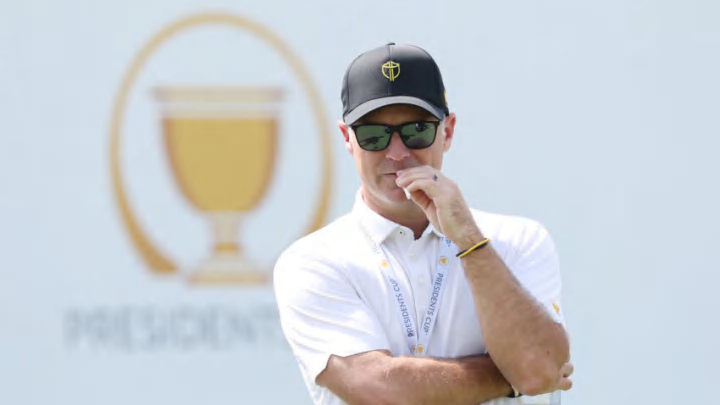The defections of LIV Tour players will have a noticeable impact on the fields for this week’s Presidents Cup, and that impact will be very one-sided.
Seven players who defected from the PGA Tour to LIV probably would have been in this week’s field, at least based on their recent statistical profiles. Five of those seven would have teed it up for the Internationals, only two for the American side.
Even worse for the Internationals, three of their five defections would have played key roles in the team’s effort to end a Presidents Cup losing streak that now stretches back eight playing through 2005. The U.S. team is 11-1-1 in Presidents Cup play since the competition began in 1994.
LIV Tour defections disproportionately hurt the International Presidents Cup Team.
It’s not that the season’s LIV Tour defections did volume damage to the Presidents Cup competition itself. Of the 24 players this week, 17 probably would have made it to Quail Hollow even had there been no split.
The problem is that statistically the LIV defections probably stripped the Internationals of their second, third, and fourth best players, while obviously forcing that roster to be filled out with players of measurably lesser quality.
Perhaps the remarkable thing is that only seven of the 48 LIV Tour regulars appear likely to have made a Presidents Cup team had they remained with the existing structure. And those seven do not include some of the game’s best-known figures, whose reputations exceeded their recent performances.
That list of well-known likely non-invitees includes Americans Bryson DeChambeau and Brooks Koepka as well as Abraham Ancer for the Internationals.
The seven LIV players whose absences likely will be missed are Louis Oosthuizen, Cameron Smith, Joaquin Niemann, Sergio Garcia, and Matt Jones, all for the Internationals, as well as Americans Patrick Reed and Dustin Johnson.
Although there’s no sure way to tell who’s replacing them, statistically it appears that their fill-ins are Internationals Tom Kim, Cam Davis, K.H. Lee, Si Woo Kim, and Sebastian Munoz, along with Americans Kevin Kisner and Sam Burns.
By the numbers, those are the weak links on both teams.
The problem for the Internationals is that their losses are likely to be a lot more painful. Based on the standard deviation of Strokes Gained data for each player for the 2021-22 season – or 2020-21, if the player did not compete on the PGA Tour for most of 2021-22 – the International team took by far the harder hit.
Had they played, Oosthuizen, Smith, and Niemann would have been the second, third, and fourth strongest players on the International team, based on the standard deviation of their recent performances. Only Sungjae Im would have been superior.
They also would have ranked as the seventh, eighth, and ninth strongest of all 24. As it is, the International representation in the top 10 includes only Im (4th overall) and Mito Pereira (ninth)., offset by eight Americans.
Garcia and Jones would have filled supplementary roles, but still would likely have been superior choices to any of the International team’s five weakest links, Tom Kim, Si Woo Kim, K.H. Lee, Sebastian Munoz, and Cam Davis.
The U.S. team really only has one weak link, that being Kevin Kisner, although Reed and Johnson probably would have both merited selection ahead of Billy Horschel.
You can see the difference in impact on both teams by looking at the average standard deviation of the play of U.S. and International team members in the four major Strokes Gained categories – Off The Tee, Approaching the Greens, Around the Greens, and Putting — for their most recent season.
Without Reed and Johnson, the dozen U.S. team members averaged (0.85) standard deviations better than their PGA Tour counterparts. Subbing Reed and Johnson for Kisner and Horschel, that average would have risen, but only to (0.894).
Compare that with the impact of the loss of the five Internationals. As it is, the International Presidents Cup team that will take the course at Quail Hollow this week averaged (0.442) standard deviations better than PGA Tour players generally. That’s a little better than half as good as the American team.
But sub in the averages or projected averages of Oosthuizen, Smith, Niemann, Garcia, and Jones for Kim, Kim, Lee, Munoz, and Davis, and that Internationals’ average score climbs to (0.650). That’s still not on a level with the U.S. team’s (0.894) with Reed and Johnson, but it closes about half the gap.
Under any circumstance, the U.S. team would have been heavy favorites at the 2022 Presidents Cup. But the LIV Tour defections exacerbate that competitive imbalance even more.
